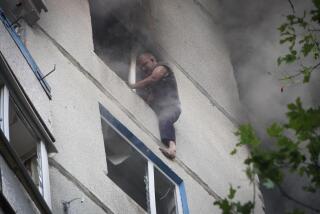Ethnic violence in Kyrgyzstan leaves at least 45 dead
- Share via
Reporting from Moscow — Ethnic violence that began as fistfights and escalated to raging gun battles broke out in the Central Asia nation of Kyrgyzstan, leaving at least 45 people dead and more than 600 injured, Russian news reports and an eyewitness said Friday.
The clashes in the southern city of Osh began Thursday evening between several hundred Kyrgyz and Uzbek youths, said the witness, human rights activist Almaz Kalet.
Combatants at first battled with fists, sticks and metal rods, but by about 2 a.m. Friday their numbers had grown to several thousand and they were fighting across the city center using automatic rifles, shotguns and other weapons, Kalet said in a telephone interview from Osh, where he lives.
“Youths armed with sticks, metal rods, guns and bottles with Molotov cocktail were running after each other wearing white, blue and red armbands and kerchiefs over their noses and mouths,” said Kalet, who works with the Center for Journalism in Extreme Situations, a Moscow-based rights group. “They were overturning cars in the streets and setting them on fire, looting shops and houses and setting them on fire too.”
The fighting calmed down after troops in armored personnel carriers and tanks rolled into the city shortly before dawn, Kalet said. But it flared up again in the late afternoon.
“We heard gunfire, shouts and screams, and glass breaking all over the place,” Kalet said. “The troops came here and the fighting moved on to the suburbs. We can still hear sporadic gunfire all around the city.”
The violence provided a fresh challenge to the interim government of Kyrgyzstan, which has struggled to impose control since a coup in April drove President Kurmanbek Bakiyev from power and into exile. The country, a former Soviet republic, has been racked by occasional violence since Bakiyev’s overthrow.
On Friday, the interim government declared a state of emergency in the south.
“Regrettably for us, we’re clearly talking about a standoff between two ethnicities,” interim President Roza Otunbayeva said in the capital, Bishkek, Reuters news service reported. “We need [to muster] forces and means to stop and calm these people down, and this is what we are doing right now.”
The ethnic violence appeared to be the worst in Kyrgyzstan since 1990, when clashes between Kyrgyz and Uzbeks claimed several hundred lives.
Uzbeks, who make up 14% of the population, are the second-largest ethnic group in the country after the Kyrgyz, at 70%. But Osh is evenly divided between the two groups.
“I don’t know what caused the fighting,” Kalet said. “For these youths, whether they are Kyrgyz or Uzbeks, ethnic hatred is just a handy cover to indulge in rampage and looting.”
Russian President Dmitry Medvedev, in neighboring Uzbekistan for a meeting with leaders of Central Asian nations, told reporters in remarks carried by Vesti-24 channel that “the absence of power and control creates the best grounds for violations of elementary human rights.
“We express hope that the interim leadership of [Kyrgyzstan], which has yet to prove its legitimacy and efficiency, will take the situation under control,” said Medvedev. “We are ready to consider offering advantageous loans but we need to understand how all this will be spent.”
Kyrgyzstan hosts a major U.S. air base that provides support to the Western military forces in Afghanistan. Bakiyev threatened to close the base last year, but later agreed to continue the arrangement with a significant increase in rent.
More to Read
Sign up for Essential California
The most important California stories and recommendations in your inbox every morning.
You may occasionally receive promotional content from the Los Angeles Times.










